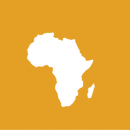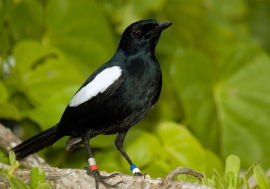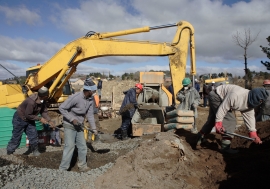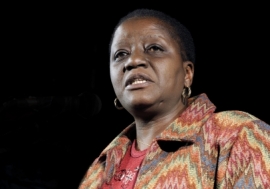Africa Watch
TICAD
Japan pushes Asia-Africa ties
More than 40 African heads of state are expected to meet with leaders of Japan and other Asian countries in late May to find ways to strengthen economic and political cooperation between the two regions. This Tokyo International Conference on African Development (TICAD), scheduled for 28-30 May in Yokohama (30 kilometres south of Tokyo), will be the fourth such gathering since the first one was held in 1993. Since then, TICAD has evolved into a major global framework for policy dialogue on African development issues. It emphasizes African ownership and partnership between Africa and the international community, especially Asia. TICAD IV is being co-organized by the government of Japan, the UN Development Programme (UNDP), the UN Office of the Special Adviser on Africa (OSAA) and the World Bank.
“The time has come for TICAD to make a significant leap forward by effectively taking up mid- and long-term issues for five or ten years into the future,” says Japanese Foreign Minister Masahiko Koumura. Organizers plan to focus the discussions on three broad priority areas: boosting economic growth; ensuring “human security” (including achievement of the Millennium Development Goals and consolidation of peace and democratization); and addressing environmental issues and climate change.
The last conference in 2003 recognized the New Partnership for Africa’s Development (NEPAD) as the continent’s central framework for development and international cooperation. “TICAD is working in collaboration with NEPAD to promote regional integration,” notes Bouna Diouf, UNDP’s TICAD director. It also aims to strengthen the African Union’s efforts to advance peace and good governance and to encourage the domestic and international private sectors to invest more in Africa’s development. TICAD’s recommendations will be fed into the next summit meeting of the Group of Eight industrialized countries, set for July in Hokkaido, Japan.
GENDER VIOLENCE
UN launches global campaign to end abuse
UN Secretary-General Ban Ki-moon on 25 February launched a multi-year campaign to end violence against women. The campaign will focus on securing national and international support, and funding from governments, businesses and other institutions to tackle the problem. “Violence against women is an issue that cannot wait,” Mr. Ban declared.
The campaign, known as Unite to End Violence Against Women, builds on efforts already under way by civil society groups, women’s movements and agencies such as the UN Development Fund for Women (UNIFEM). It also extends the work of UN Action Against Sexual Violence in Conflict, a multi-agency initiative that addresses rape, sexual slavery and other forms of gender violence as tools of war.
The new campaign will emphasize the need to encourage men to become more actively involved, the Secretary- General said at the launch. “I call on men around the world, Mr. Ban said, “to make clear that violence against women is an act perpetrated by a coward, and that speaking up is a badge of honour.” At a press briefing, Kevin Powell, a male activist and author, said that violence against women is “one of the most critical challenges” facing humanity in the 21st century. “We need to become allies to women,” he said, adding that the problem is not likely to end “until men become partners in ending violence.”
Appointments
 Photograph: UN Photo / Marco Castro
Photograph: UN Photo / Marco CastroMr. Jean Ping of Gabon has been elected as the new chairman of the African Union (AU) Commission, replacing Mr. Alpha Oumar Konaré. He previously served as his country’s foreign minister from 1999 to 2008 and as president of the 59th session of the UN General Assembly in 2004. He began his professional career at the UN Educational, Scientific and Cultural Organization (UNESCO) in 1972. He also served as president of the Organization of Petroleum Exporting Countries (OPEC) in 1993.
 Photograph: WFP
Photograph: WFPThe UN Secretary-General has appointed Ms. Susana Malcorra of Argentina as the head of the Department of Field Support, at the rank of under-secretary-general. The department was established in July 2007 to provide support to all of the UN’s peace missions worldwide. Prior to this appointment, Ms. Malcorra served as chief operating officer and deputy executive director of the World Food Programme (WFP), overseeing daily emergency and humanitarian operations in more than 80 countries. Ms. Malcorra also has 25 years of experience in the private sector, including leadership roles at International Business Machines (IBM) and Telecom Argentina.
 Photograph: UN Photo / Eskinder Debebe
Photograph: UN Photo / Eskinder DebebeMr. Ray Chambers of the US has been appointed by the UN Secretary-General as his special envoy for malaria. Mr. Chambers previously was the founder and co-chairman of Malaria No More, co-founder of the National Mentoring Partnership and chairman of the Millennium Promise Alliance.
 Photograph: UN Photo / Paulo Filgueiras
Photograph: UN Photo / Paulo FilgueirasIn January, the UN Secretary-General appointed Mr. Cheikh Sidi Diarra of Mali as the new UN special advisor on Africa, in addition to his existing position as high representative for the least developed countries, landlocked developing countries and small island developing states. Previously, Mr. Diarra served as permanent representative of Mali to the UN in New York.
















